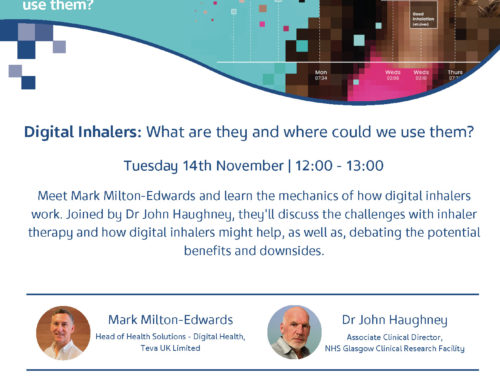 The number of people diagnosed with diabetes in Northern Ireland has increased by 62.5 per cent in the last decade, according to analysis released by the Diabetes UK Northern Ireland in 2018. With renal and cardiovascular outcomes also drawing enhanced concern, the necessity of greater intervention has been sparked. Anna Strzelecka, SAS Doctor in Diabetes and Endocrinology, Antrim Area Hospital, Northern Health & Social Care Trust, outlines her involvement in an exciting trial, and how it is eliciting hope.
The number of people diagnosed with diabetes in Northern Ireland has increased by 62.5 per cent in the last decade, according to analysis released by the Diabetes UK Northern Ireland in 2018. With renal and cardiovascular outcomes also drawing enhanced concern, the necessity of greater intervention has been sparked. Anna Strzelecka, SAS Doctor in Diabetes and Endocrinology, Antrim Area Hospital, Northern Health & Social Care Trust, outlines her involvement in an exciting trial, and how it is eliciting hope.
Data from 2018 showed that there were 92,480 people diagnosed with diabetes, an increase of 35,556 adults compared with 2007. The data also showed that the number of people who have been diagnosed with type 1 and type 2 diabetes has increased by 4,175 from 2017-to-2018 (from 88,305-to-92,480).
Almost nine-in-10 people diagnosed with diabetes have type 2, and in 2018 it was estimated that there were 11,521 people living with the condition but not yet diagnosed. Counting this undiagnosed population, the total number of people living with diabetes in Northern Ireland reached 104,001 in 2018.
The Northern Health & Social Care Trust area appeared to have the highest prevalence in Northern Ireland, with 23,878 of people living with diabetes in 2018 (6.5 per cent). (1)
Diabetes remains the single most common cause of kidney failure. Almost four-in-five people with diabetes will develop kidney disease in their lifetime. 11 per cent of deaths in type 2 diabetes are caused by kidney disease. (2)
Diabetic kidney disease is a leading cause of end-stage renal disease (ESRD). (3, 4, 5)
27.5 per cent of new cases needing dialysis or renal transplant are caused by type 2 diabetes. (4)
In the UK, the total annual costs to the NHS of managing diabetic nephropathy in 2004 was £152 million for type 1 diabetes, and £614 million for type 2 diabetes. (6)
The annual cost of CKD to the NHS in England in 2009-to-2010 was estimated at £1.45 billion (1.3 per cent of total NHS expenditure), with the cost of RRT accounting for more than half of this total. (7)
CREDENCE study results showed the relative risk reduction of the primary outcome (composite outcome of ESKD, doubling of serum creatinine, or renal or CV death) by 30 per cent in the Canagliflozin group than in the placebo group, with event rates of 43.2 and 61.2 per 1,000 patient-years, respectively (hazard ratio, 0.70; 95 per cent confidence interval [CI], 0.59 to 0.82; P=0.00001). The relative risk of the renal-specific composite of end-stage kidney disease, a doubling of the creatinine level, or death from renal causes was lower by 34 per cent (hazard ratio, 0.66; 95 per cent CI, 0.53 to 0.81; P<0.001), and the relative risk of end-stage kidney disease was lower by 32 per cent (hazard ratio, 0.68; 95 per cent CI, 0.54 to 0.86; P=0.002). (8)
A consensus report by the American Diabetes Association (ADA) and the European Association for the Study of Diabetes (EASD) from 2018 recommends that for patients with chronic kidney disease or clinical heart failure and atherosclerotic cardiovascular disease, an SGLT2 inhibitor with proven benefit is recommended. GLP-1 receptor agonists are generally recommended as the first injectable medication. (9)
| Proven CVD benefit means it has label indication of reducing CVD events. For GLP-1 RA, strongest evidence for liraglutide > semaglutide > exenatide extended release. For SGLT2i, evidence modestly stronger for empagliflozin > canagliflozin.
Both empagliflozin and canagliflozin have shown reduction in HF and to reduce CKD progression in CVOTs. |
Case Report
A 66-year-old gentleman diagnosed with type 2 diabetes in April 2006 attending outpatient diabetic clinic in Whiteabbey Hospital, Northern Ireland. His other medical history included adrenal adenoma and duodenal ulcer.
At review in June 2016 the patient was taking Metformin SR 500mg daily, Sitagliptin 100mg daily, Apidra 24 units at breakfast and lunch and Levemir 24 units in the morning and at bedtime. His non-diabetic medication included: Citalopram 20mg, Clopidrogrel 75mg, Irbesartan 300mg, Omeprazole 20mg and Rosuvastatin 10mg.
At that time his HbA1c level was 76mmol/mol, eGFR 47mLs/min/1.73m^2 and ACR 60.8mg/mmol creatinine.
The patient met inclusion criteria for CREDENCE study, consented to participate and was randomised to take part in the trial in September 2016.
During the study his HbA1c improved to 65mmol/mol in September 2017 and 64mmol/mol a year later. His ACR decreased to 17.7mg/mmol creatinine and eGFR improved greatly to >60mLs/min/1.73m^2.
In October 2018 the trial was stopped so the patient had to be taken off the study medication. Just to mention the trial was stopped early after a planned interim analysis reviewed by an Independent Data Monitoring Committee. Median follow-up was 2.62 years.
After the trial termination, the patient’s glycaemic control and ACR levels deteriorated (HbA1c 76mmol/mol and ACR 144.4mg/mmol creatinine in January 2019), however eGFR remained stable at >60mLs/min/1.73m^2.
The patient attended outpatient clinic in May 2019, at that time his HbA1c was 71mmol/mol and ACR 133.7mg/mmol creatinine. The patient stated that he was feeling much better when participating in the CREDENCE study. His blood glucose levels were much more stable while receiving study medication and he was taking much smaller insulin doses. As patient’s eGFR was >60mLs/min/1.73m^2 patient was commenced on Canagliflozin 100mg daily.
The patient was reviewed at the clinic in September 2019, HbA1c improved to 64mmol/mol and ACR to 40.6 mg/mmol creatinine. Insulin doses were reduced and the patient was feeling much better. By December 2019 HbA1c improved further to 53 mmol/mol and ACR 14 mg/mmol creatinine. eGFR remained stable at >60mLs/min/1.73m^2. At that time the patient was taking Metformin SR 500mg daily, Sitagliptin 100mg daily, Canagliflozin 100mg daily, Apidra four units at breakfast, six units at lunch and dinner and Levemir 16 units in the morning.
| Pre CREDENCE | During
CREDENCE |
During
CREDENCE |
After CREDENCE stopped | c/o Canagliflozin | On Canagliflozin | On
Canagliflozin |
|
| June 2016 | Sept 2017 | Sept 2018 | January 2019 | May 2019 | September 2019 | December 2019 | |
| HbA1c (mmol/mol) | 76 | 65 | 64 | 76 | 71 | 64 | 53 |
| eGFR
(mLs/min/1.73m^2) |
47 | >60 | >60 | >60 | >60 | >60 | >60 |
| ACR
(mg/mmol creatinine) |
60.8 | 17.7 | 144.4 | 133.7 | 40.6 | 14 |
Conclusion
Diabetes is the most common cause of chronic kidney disease and end-stage renal disease. Kidney involvement, both directly and indirectly, increases involvement of other organs and increases morbidity and mortality in diabetic patients.
With untreated diabetic nephropathy, a significant decrease in life-expectancy of patients happens, therefore prevention of this debilitating condition, along with early diagnosis and treatment is very important.
Randomised clinical trials showed the beneficial effects of Canagliflozin on renal outcomes and this case report proves that benefit in a real clinical setting.
Treatment with Canagliflozin should be therefore considered early in patients with diabetic kidney disease.
Updated ADA/EASD guidelines recommend use of SGLT2 inhibitors with evidence of reducing CKD progression in CVOTs in patients with chronic kidney disease.
In the presence of severe albuminuria Invokna 100mg can now be initiated down to an eGFR of 30 and the patient can stay on it right down to Renal Replacement Therapy or Renal transplantation.
References
- Number of people with diabetes in Northern Ireland increases by 62.5% in a decade. 28 February 2018 diabetes.org.uk
- Morrish NJ, Wang SL, Stevens LK et al (2001). Mortality and causes of death in the WHO multinational study of vascular disease in diabetes. Diabetologia 44, suppl 2; s14–s21
- Wu B, et al. BMJ Open Diabetes Res Care 2016;4(1):e000154
- Gilg J, Methven S, Casula A, Castledine C. UK Renal Registry 19th Annual Report: Chapter 1. UK RRT Adult Indicence in 2015: National and Centre-specific Analyses. Nephron 2017;137(Suppl 1): 11-44
- co.uk. Diabetic nephropathy – kidney disease. [Accessed May 2019]. www.diabetes.co.uk/diabetes-complications/kidney-disease.html
- Gordois A, Scuffham P, Shearer A, Oglesby A. The health care costs of diabetic nephropathy in the United States and the United Kingdom. J Diabetes Complications. 2004 Jan-Feb;18(1):18-26.
- Kerr M, Bray B, Medcalf J, O’Donoghue DJ, Matthews B. Estimating the financial cost of chronic kidney disease to the NHS in England. Nephrol Dial Transpl. 2012;27:73–80
- Vlado Perkovic, et al. Canagliflozin and Renal Outcomes in Type 2 Diabetes and Nephropathy. N Engl J Med 2019; 380:2295-2306
- Davies MJ, D’Alessio DA, Fradkin J et al (2018) Management of hyperglycaemia in type 2 diabetes, 2018. A consensus report by the American Diabetes Association (ADA) and the European Association for the Study of Diabetes (EASD). Diabetologia. 61(12):2461–2498
For more information, read ‘Testing for kidney disease in type 2 diabetes: consensus statement and recommendations’at








